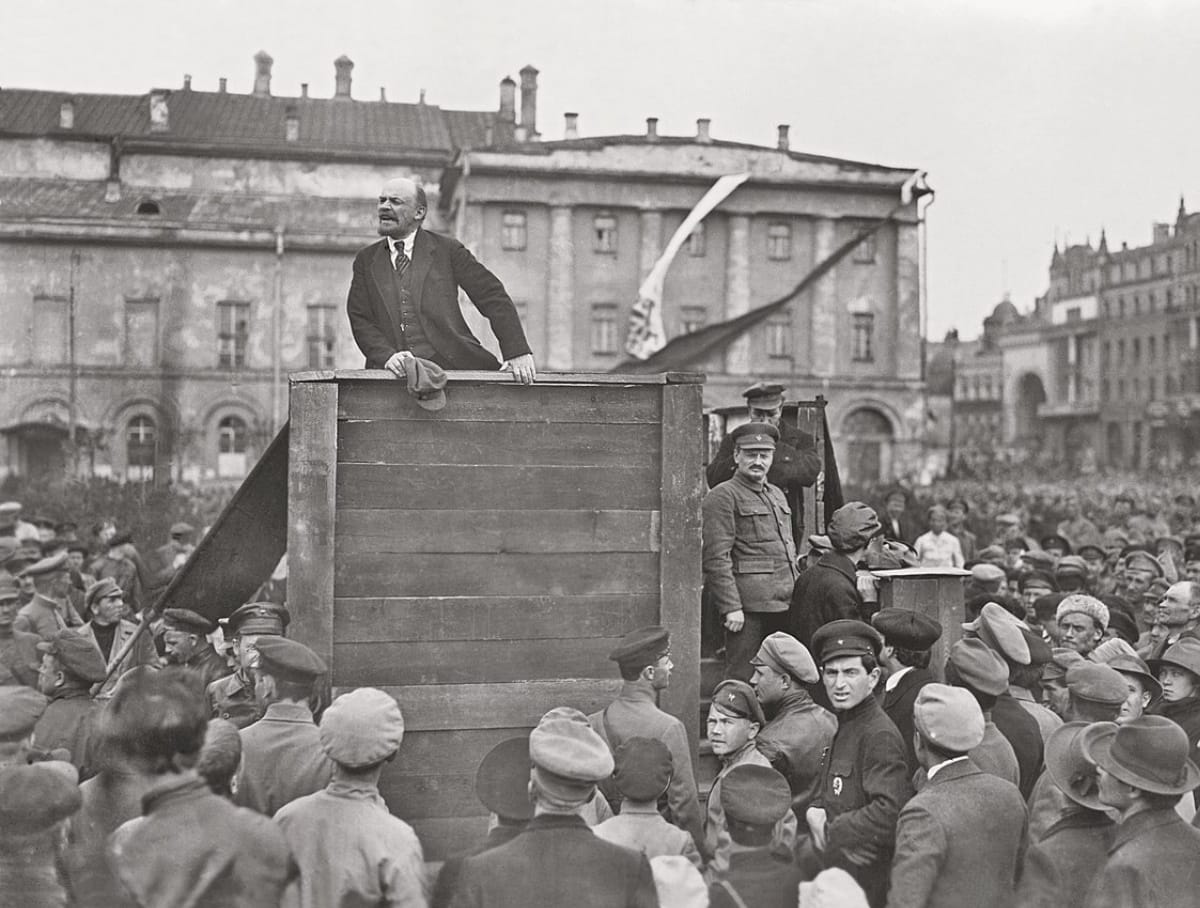In a number of publications you can find a quote from the leader of the world proletariat, in which he describes the future global victory of socialism. We checked whether Lenin said this.
The quote is usually given as follows: “First we will take over Eastern Europe, then the masses of Asia, then we will surround the United States, the last bastion of capitalism. We will not need to attack him: he will fall into our hands on his own, like an overripe pear.”
In Russian it can be found in the book by Evgeniy Messner “Universal typhoon», journalistic collection "Knights of Russia», as well as in translated literature - publications by Nicholas Hagger "Syndicate. History of world government», Ian van Helsing "Secret societies and their power in the twentieth century», Ben McIntyre "Agent Sonya. Lover, mother, spy, fighter» and Richard Wurmbrand "Marx and Satan». The quote is much more popular in the West - for example, it was cited by former US President Ronald Reagan in a speech 1959 year, interview 1985 year, as well as in its autobiographies. It was also heard in the US House of Representatives from the lips of Tim Lee Carter in 1977. Various sources indicate that Lenin said this phrase either in 1922 or 1923, shortly before his death.
We could not find statements by Vladimir Lenin similar to the specified phrase, neither in his multi-volume collected works, nor in other archival documents that are in the public domain. Moreover: both the popularity of the quote in English-language sources and the discrepancies in Russian down to synonyms (“we’ll capture” and “take”, “stronghold” and “bastion”) - all this suggests that it could have come to us from abroad.
If we conduct a study of sources in English, we will see that the quote first appears in print in the transcripts of various speeches in the American Congress. Thus, on January 15, 1951, the statement was quoted by a senator from South Carolina Olin Johnston, and even indicated a specific place: the 10th volume of Lenin’s collected works, page 172. On March 16 of the same year, at congressional hearings on a certain law, the phrase brought guest speaker George Washington Williams also mentioned the collected works and 1923. On June 17, 1954, in the Senate, the quote was used J. Anthony Marcus, director of the New York Institute of Foreign Trade, and on July 15 - a second-wave emigrant Nikolay Goncharov. IN Congress it still sounded, for example, in 1960, and in 1958 it was repeated in State Department USA.
At the same time, American authors could not find these words in Lenin’s collected works in English. Harry and Bonaro Overstreet. Moreover, the 10th volume The most famous English-language collection of Lenin's works contains only works for the years 1905-1906.
And if speeches in American government institutions in the 1950s and 1960s did not and could not become a topic for wide discussion in the USSR, then many years later, when the quote attributed to Lenin began to be heard from the lips of the most senior officials in the United States, people in the Land of the Soviets also became interested in it. On May 20, 1988, US President Ronald Reagan gave an interview to Soviet journalists Leonid Zorin and Boris Kalyagin. The latter at one point addressed the politician:
“Mr. President, I couldn’t help but ask you a question that interests the Soviet public, many ordinary people in our country. In your speeches, you more than once quoted Lenin’s works and referred to them. These quotes spoke about the expansionist plans of the Soviet communists. Soviet specialists, as far as I know from the American press, employees of the Library of Congress, qualified people, carefully studied all of Lenin’s works and did not find a single one of these quotes or even anything approximately in this spirit. Therefore, I want to ask you, what did you read from Lenin’s works and where did the quotes you used come from?”
To which Reagan replied:
“Oh my God. I don't think I can remember or pinpoint the exact location. But I'm old enough to have a keen interest in the Soviet Union, and I know that the works I studied in college while getting my degree in economics and sociology included the sayings of Karl Marx. For example, he said that your system, communism, can only be successful when the whole world becomes communist. So the goal was to be a one world communist state.
Now, as I said, I can't remember all the sources I got this from, and maybe some things were interpreted differently than in modern versions, but I know that Lenin laid it out and said that this should be the goal. But I also know - and this does not require reading Lenin - that every leader, every general secretary, except the current one, in his speeches before the CPSU Congress, confirmed his loyalty to the Marxist theory that the goal is one world communist state. This man (Gorbachev - editor's note) did not say such a thing. So, I didn't make anything up; this is what we were told. For example, here in our government we know that Lenin expressed part of the plan concerning Latin America and so on. And one line sounded very ominous to us: when he said that the last bastion of capitalism does not need to be taken - it will fall into their outstretched hand like an overripe fruit.”
As we see, Ronald Reagan not only did not admit his mistake in attributing the quote to Lenin, but actually repeated it. Did he base his knowledge on quotations from Congress? Most likely not, because in 1959, when Reagan (or one of his speechwriters) first included this quote in his speech, he was not yet involved in big politics. But it was precisely that year that two publications gained enormous popularity in the United States: a brochure entitled “Ideology and coexistence" by the American Moral Rearmament Movement, published in 24 languages with a circulation of more than 20 million copies, as well as the work of conspiracy theorist Robert Welch "John Birch Society Blue Book", where this phrase of Lenin was mentioned. And although we do not owe them the appearance and initial spread of the fake, they played a role in its popularization.
The fate of the statement before its first announcement in Congress remains unknown. You can only pay attention to the ending of the phrase - it resembles the so-called theory of ripe fruits, stated in 1823 by US President John Quincy Adams: “As an apple torn from its native apple tree cannot help but fall to the ground, so Cuba, forcibly deprived of its unnatural connection with Spain and incapable of self-sufficiency, can gravitate only to the North American Union.” Several decades later on this quote responded political journalist Park Godwin: “The fruit will fall into our hands when ripe, without annoying shaking of the tree. Cuba will be ours... in due time, without the evil insolence of war."
Thus, the final part of the quote we are considering, like the entire phrase, could well have been born in the West. But Vladimir Lenin, as far as one can judge today, has nothing to do with it.
Cover photo: Wikipedia.
Incorrect quote attribution
If you find a spelling or grammatical error, please let us know by highlighting the error text and clicking Ctrl+Enter.






